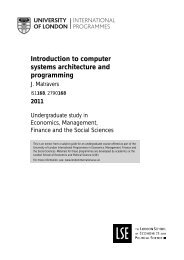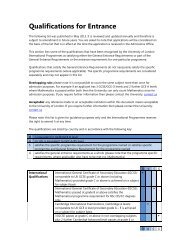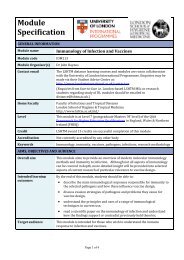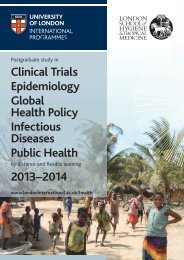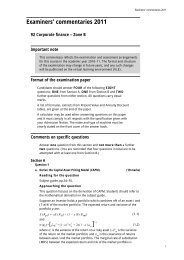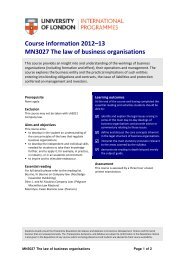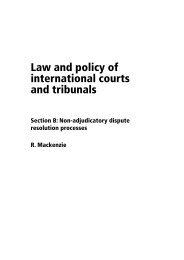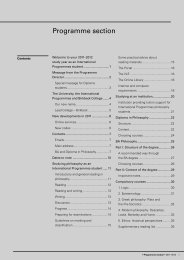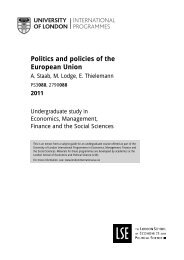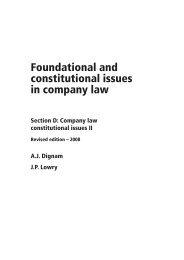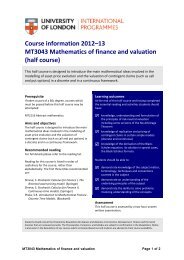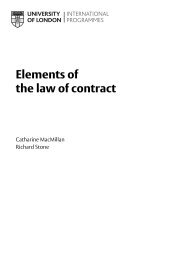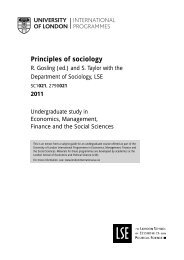Public law - University of London International Programmes
Public law - University of London International Programmes
Public law - University of London International Programmes
You also want an ePaper? Increase the reach of your titles
YUMPU automatically turns print PDFs into web optimized ePapers that Google loves.
page 12 <strong>University</strong> <strong>of</strong> <strong>London</strong> <strong>International</strong> <strong>Programmes</strong><br />
1.4.6 How do we assess the quality <strong>of</strong> learning and thinking?<br />
Your diverse learning about public <strong>law</strong> issues will enable you to develop a deeper<br />
understanding <strong>of</strong> the field. Your examiners will want to distinguish between deep<br />
and surface approaches to learning. A surface approach would rely almost entirely<br />
on memory <strong>of</strong> facts, and perhaps any ability to recall ‘model answers’ to a few central<br />
questions.<br />
But facts without understanding and analysis will not impress the examiners.<br />
Examiners will assess you through more demanding criteria. They will ask:<br />
Is the student engaging in critical thinking to the depth or extent required?<br />
How thorough is their attempt to apply and evaluate ideas and theories?<br />
Are they showing sufficient inventiveness and flexibility?<br />
Do they really understand basic concepts?<br />
When engaged in evaluation and making judgments, are they generating<br />
appropriate and viable alternatives, enough data on the outcomes <strong>of</strong> those<br />
alternatives, and sufficiently rigorous criteria for judging those outcomes?<br />
The outcomes <strong>of</strong> a deep approach to learning usually include an in-depth<br />
understanding <strong>of</strong> content, the ability to use what has been learnt to describe,<br />
interpret, predict and theorise about events and the ability to formulate new insights<br />
and new ways <strong>of</strong> defining and approaching problems. These are usually regarded as<br />
the proper outcomes <strong>of</strong> a higher education.<br />
1.4.7 Study time<br />
You should set aside a specific amount <strong>of</strong> time each week to study this subject,<br />
increasing the amount in the six weeks before the examination. Remember, though,<br />
that individuals vary greatly in their needs; the time to stop studying is when you<br />
know the topic thoroughly, and not until then. It is very important to plan your time<br />
carefully. Do not forget to leave time every week and month for revision in addition to<br />
the period before the examination. Revision must be a continuous process.<br />
1.5 The portfolio/learning journal<br />
One <strong>of</strong> the key elements in demonstrating these skills will be your portfolio.<br />
Throughout this guide you will notice certain portfolio prompts. In the <strong>University</strong> <strong>of</strong><br />
<strong>London</strong> programme we have a specific portfolio – the Skills portfolio – that any student<br />
who wishes to obtain a Qualifying Law Degree for England and Wales must develop<br />
and present for assessment in their final year. This is to ‘demonstrate’ the subjectspecific<br />
and transferable skills that we expect you to attain. You may feel that you<br />
have these skills, but the point is to formally demonstrate them in an assessed mode.<br />
From your second year you should use the online e-portfolio system to compile your<br />
evidence base and reflection on your evidence. However, your <strong>Public</strong> <strong>law</strong> notebook,<br />
ring binder or learning journal will always support your learning, whether or not<br />
you are going to submit your Skills portfolio for assessment. Making entries in your<br />
notebook or ring binder will give you an opportunity to reflect on your learning, to<br />
map out the process and gauge whether you are meeting the learning outcomes for<br />
the subject.<br />
The important aspect here is reflection: in the other first year subject guides you<br />
may find reflection prompts rather than portfolio prompts, but what unites these is<br />
the belief that reflection is necessary for authentic self-understanding and learning<br />
processes that last.<br />
Throughout the guide we will give prompts, indicated by this symbol:



